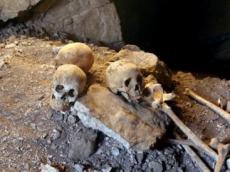|
|
TODAY.AZ / Weird / Interesting
Children found 1800-year old human remains in Arizona
27 March 2014 [12:20] - TODAY.AZ
 Human remains found by two children playing in the desert hills in northwestern Arizona last year are believed to be that of an American Indian man who lived about 1,800 years ago, a local anthropologist said on Wednesday.
Human remains found by two children playing in the desert hills in northwestern Arizona last year are believed to be that of an American Indian man who lived about 1,800 years ago, a local anthropologist said on Wednesday.Giving an approximate date to the largely complete skeletal remains, which were recovered in an area southeast of Colorado City, was only accomplished recently, said Amy Kelly-McLaughlin, the anthropologist who examined them. She specializes in vertebrate forensic taphonomy, the study of ancient remains.
But the Flagstaff, Arizona-based Kelly-McLaughlin, who was hired by the Mohave County Medical Examiner's Office to find out more about the remains, said the results validate her initial impression.
"The minute I opened the box with the bones I knew it was prehistoric," she said in a phone interview. "There was just no doubt in my mind that it is."
She said the remains, which belonged to a man whose age at death was unclear, were well-preserved and represented about 85 percent of the body. They displayed classic prehistoric signs that included deeply stained bones from the sediment in the ground and severely decayed teeth.
"What we have is an adult male who passed away at some point and the people he was with buried him long, long ago," Kelly-McLaughlin said. "That's a pretty special thing to find."
She said the discovery was unusual but not rare, adding that she is asked to examine remains that turn out to be prehistoric on average every 12 to 18 months.
Mohave County sheriff deputies said the remains were located when the two children were hiking with their mother last November near the polygamous town that straddles the Arizona-Utah border. The youths had stopped and saw bones sticking out of the ground.
"At first they thought they were animal bones," said Trish Carter, a sheriff's office spokeswoman. "But that didn't turn out to be the case."
Authorities were alerted after the group then found what appeared to be a human skull, according to a sheriff's report.
The county Medical Examiner's Office responded to the scene and collected the remains before turning them over to Kelly-McLaughlin for a determination.
She said she plans to contact area tribal officials to find the proper place for the remains so that they can be re-buried. She expects the process to take about a year.
/Reuters/
URL: http://www.today.az/news/interesting/132079.html
 Print version
Print version
Views: 2992
Connect with us. Get latest news and updates.
See Also
- 19 February 2025 [22:20]
Visa and Mastercard can return to Russia, but with restrictions - 05 February 2025 [19:41]
Japan plans to negotiate with Trump to increase LNG imports from United States - 23 January 2025 [23:20]
Dubai once again named cleanest city in the world - 06 December 2024 [22:20]
Are scented candles harmful to health? - 23 November 2024 [14:11]
Magnitude 4.5 earthquake hits Azerbaijan's Lachin - 20 November 2024 [23:30]
Launch vehicle with prototype of Starship made its sixth test flight - 27 October 2024 [09:00]
Fuel prices expected to rise in Sweden - 24 October 2024 [19:14]
Turkiye strikes terror targets in Iraq and Syria - 23 October 2024 [23:46]
Kazakhstan supplied almost entire volume of oil planned for 2024 to Germany in 9 months - 23 October 2024 [22:17]
Taiwan reported passage of Chinese Navy aircraft carrier near island
Most Popular
 Macron's formula: War is war, and money is on schedule
Macron's formula: War is war, and money is on schedule
 China’s renewable tech empire and its influence on the GCC's energy ambitions
China’s renewable tech empire and its influence on the GCC's energy ambitions
 Horadiz-Aghband railway to enhance global trade & regional connectivity
Horadiz-Aghband railway to enhance global trade & regional connectivity
 Investigation reveals torture leading to deaths of 170 Azerbaijani prisoners, says SSS official
Investigation reveals torture leading to deaths of 170 Azerbaijani prisoners, says SSS official
 China, Russia, and Iran to hold joint military exercises in March
China, Russia, and Iran to hold joint military exercises in March
 Some 50 illegal migrants detained in Aegean Sea near Turkiye's Izmir province
Some 50 illegal migrants detained in Aegean Sea near Turkiye's Izmir province
 Musk suggests sanctioning top Ukrainian oligarchs to resolve Ukraine War
Musk suggests sanctioning top Ukrainian oligarchs to resolve Ukraine War
